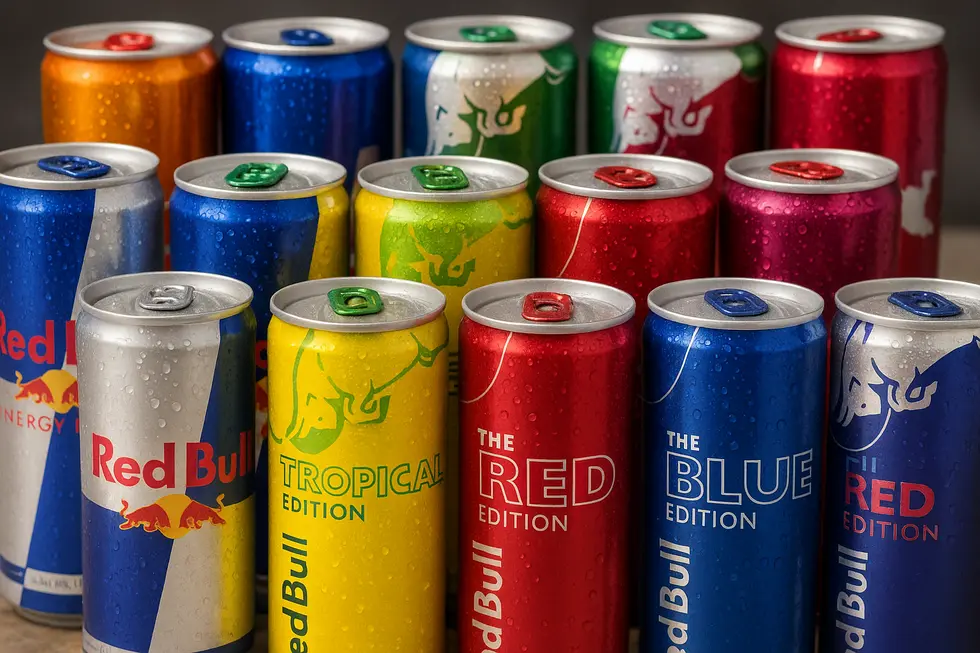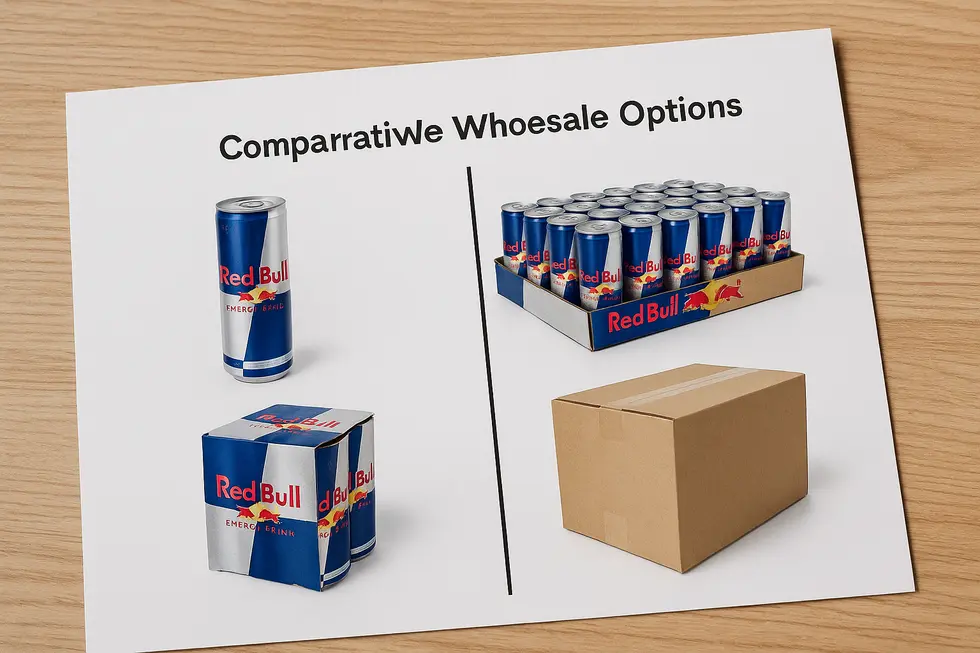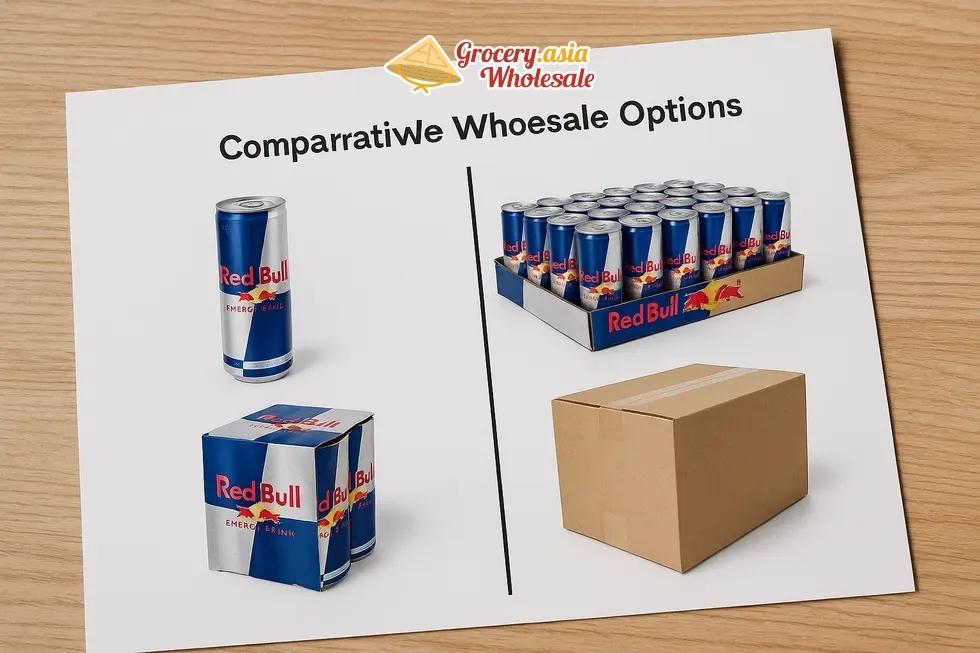No products in the cart.
Beverages News, Energy Drinks, Red Bull Energy Drink
Unlocking Wholesale Opportunities: Sourcing Authentic Red Bull for Global Markets
Navigating the highly competitive energy drink market requires a keen understanding of sourcing authentic products and optimizing distribution strategies. For importers looking to tap into the thriving demand for Red Bull, selecting the right wholesale suppliers is crucial. This guide delves into the elements of identifying genuine suppliers, explores regional distribution channels, and evaluates competitive pricing strategies. Furthermore, you’ll discover the diverse flavors and editions available for wholesale, and comprehend the nuances between consumer and business-oriented wholesale options. Each chapter builds on this journey, equipping you with the knowledge to secure lucrative business opportunities in the energy drinks industry.
Table of Contents
Navigating Authentic Wholesale Channels for Red Bull Procurement

Securing authentic Red Bull as a wholesaler demands strategic navigation through verified channels. Identifying trustworthy suppliers ensures product authenticity and reliable business relationships. Verified Wholesale Platforms serve a crucial role by connecting buyers with legitimate sellers. These platforms add a layer of trust, providing vetted connections that ease the due diligence process.
Authorized Distributors not only offer competitive pricing but also provide authenticity guarantees and dedicated support. These distributors often extend services like around-the-clock customer assistance and tailored account management, essential for smooth international transactions.
Additionally, some B2B Suppliers cater to diverse sectors, from large supermarkets to the horeca (hospitality) industry. These suppliers, often based in Europe, provide rapid delivery and uphold stringent supply chain standards to maintain trust and reliability.
Buyers should prioritize thorough supplier verification, authentication guarantees, and regional service alignment to secure genuine Red Bull products. Direct interactions or samples can further confirm legitimacy, ensuring robust procurement strategies. More insights can be found by visiting red-bull-wholesale-near-me.
Navigating Red Bull’s Global Distribution Maze: Regional Strategies Unveiled

Red Bull’s distribution channels are strategically diversified across global regions to meet specific market needs, utilizing an array of partnerships and tailored logistics. This custom approach allows them to capture and retain a robust market presence worldwide.
In Asia, Red Bull collaborates with local partners, mastering complex export and distribution logistics while adapting to regional consumer preferences. These partnerships ensure Red Bull’s market penetration is both efficient and culturally attuned.
North America embodies a different model with Red Bull Distribution Company in California acting as a full-service distributor. This hub manages a vast logistics operation, ensuring timely delivery across major retail outlets, thus supporting an extensive network successfully.
South America presents a unique scenario with Brazil as a major market due to its large consumer base and developed retail infrastructure. Here, Red Bull leverages local distributors to enhance availability. Meanwhile, Argentina’s emerging market offers growth potential, albeit with a need for regulatory adaptability.
In the Middle East, wholesale beverage networks cater to regional demands, fostering widespread availability through tailored distribution channels.
Red Bull’s overarching strategy emphasizes collaborations with local distributors, efficient full-service distribution, and adaptive marketing, facilitating a strong global footprint and responsiveness to diverse market dynamics. Explore regional offerings in detail at Red Bull wholesale in the Middle East.
Strategic Pricing: Leveraging Red Bull’s Premium Position in Wholesale Markets

Evaluating competitive pricing strategies for Red Bull wholesale requires blending brand prestige with strategic market positioning. Red Bull’s stature as a premium energy drink mandates a pricing framework that respects its market influence while ensuring profitability for wholesalers.
Pricing and Margins: In Kenya, a pivotal market for beverages, the wholesale cost of a 250ml Red Bull can ranges between KES 170-190, while retail prices hover around KES 220. This structure allows for a 15-20% margin, modest when juxtaposed with other beverages but justified by Red Bull’s brand equity. The premium cost restricts volume in price-sensitive markets but thrives in affluent venues like gyms and clubs.
Competitive Context: Relative to brands like Del Monte and Tusker Lager, which offer margins anywhere from 10% to 30%, Red Bull maintains its premium approach. Wholesale distributors are advised to select channels valuing brand performance over pricing, enhancing their market grip.
Continuous market intelligence on rivals’ strategies, such as product launches or pricing shifts, is crucial. Wholesalers should harness bulk procurement avenues to secure favorable terms, safeguarding margins without undercutting retail prices. More procurement insights can be gleaned from Red Bull 250ml wholesale. Mastery in balancing premium brand leverage with strategic channel placement fosters both margin health and sustained volume in critical markets.
Exploring Red Bull’s Flavorful Wholesale Portfolio: A Palette for Every Palate

Red Bull’s dynamic approach to the energy drink market is highlighted by its diverse array of flavors and editions designed to cater to varied consumer preferences. While the brand’s original formula remains a classic, the introduction of around 16 distinct flavors globally underscores its commitment to innovation. These include tropical infusions, berry blends, and coconut accents, ensuring there’s a flavor for every taste.
The brand doesn’t stop at taste innovation. Special editions like the “Purple Edition,” featuring an acai berry flavor, cater to consumers seeking something outside the traditional energy drink experience. These niche offerings are strategically appealing to wholesalers aiming to diversify their product ranges and meet consumer demands for both novelty and energy boosts.
Convenience and variety are central to Red Bull’s wholesale offerings. Suppliers provide standard bulk packaging in cases of 24 cans, with the option for mixed flavor packs. This allows retailers to present a spectrum of choice, from popular staples to exotic blends, fitting various retail environments and consumer preferences.
Amidst flavor experimentation, Red Bull consistently integrates functional ingredients across all variations, including caffeine and B vitamins, ensuring that each sip promises both energy enhancement and flavor excitement. For a specialized view on Red Bull’s wholesale offerings including unique editions such as the Purple Edition, explore the Martoo Wholesale product page.
Navigating the Spectrum of Wholesale Options for Red Bull: Consumer vs. Business Focus

Understanding the landscape of wholesale options for Red Bull necessitates a grasp of the diverse channels, pricing strategies, and logistical nuances designed for both consumer-oriented and business-oriented segments. On the consumer end, smaller retailers and individuals find convenience in warehouse clubs and restaurant supply outlets, where bulk buying is simplified. For example, Restaurant Depot offers competitive rates on products like Red Bull during peak seasons, providing an advantageous entry point for convenience stores and small cafes.
In contrast, business-oriented opportunities require a sophisticated approach, dealing with import regulations, strategic market analyses, and significant purchase volumes. Importing entities must be structured to navigate customs with expertise—such as employing market tools to decipher pricing and buyer reliability, ensuring competitive positioning in global trade environments. This involves adherence to stringent regulatory mandates, such as HSN codes, critical for optimizing duty rates and facilitating smoother cross-border transactions.
Moreover, the logistics for business-scale distributors become a pivotal factor. They demand established partnerships that handle extensive shipping demands efficiently, offering flexibility in payments and nationwide deliveries. For specific flavors and editions of Red Bull, businesses looking into regional suppliers may find these targeted options align well with their strategic objectives. Delving into these sophisticated avenues of wholesale supply, businesses can gain a strategic edge in the energy drink market. To further explore wholesale possibilities, understanding bulk-energy drink market insights can offer comprehensive industry perspectives.
Final thoughts
In summary, successfully importing Red Bull wholesale requires a strategic approach to supplier selection, pricing, and distribution. By understanding the diverse flavors available, alongside the types of wholesale options, importers can better meet market demands. These insights empower importers to navigate the wholesale landscape effectively, ensuring authentic and profitable product offerings.
👉 Looking for a trusted Red Bull wholesale supplier? Contact Asia Grocery Co., Ltd for bulk deals and export-ready inventory.
About us
Asia Grocery Co., Ltd is a trusted distributor, wholesaler, and exporter of fast-moving consumer goods (FMCG) from Vietnam, backed by over 20 years of expertise. We deliver authentic products from globally recognized brands such as P&G, Unilever, Redbull, Coca-Cola, Pepsi, Asiadeli, along with traditional and culturally significant Asian products, catering to customers worldwide with a special focus on Vietnamese and Asian communities abroad.


